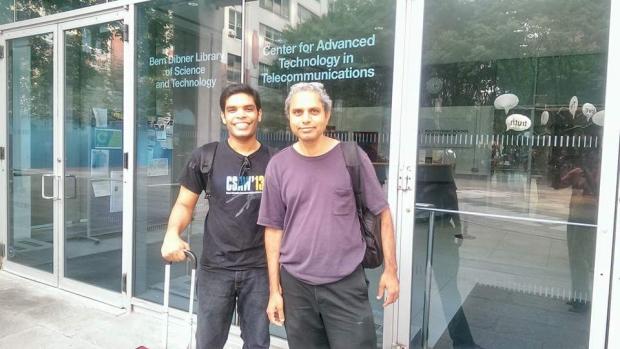The (Research) Stars Shine Bright in Texas

When Jeyavijayan (JV) Rajendran was a graduate student at the NYU Tandon School of Engineering, it was not unusual to see him mentioned on the school website. Working with Professor Ramesh Karri of Electrical and Computer Engineering, he helped cement Tandon’s reputation at the forefront of hardware security and regularly garnered best student paper awards from such groups as the Association of Computing Machinery (ACM) and the Institute of Electrical and Electronics Engineers (IEEE); research-competition prizes at the Design Automation Conference, the International Conference on Computer Aided Design, and other events; and official laurels for his academic performance from the faculty. (And that’s not to mention his service recognition award from Intel and his podium finish at the 2011 Kaspersky American Cup.)
Now a tenure-track assistant professor at the University of Texas Jonsson School of Engineering and Computer Science, in Dallas, Rajendran is still giving Tandon plenty of reason for pride. He was recently awarded a highly prestigious National Science Foundation (NSF) Faculty Early Career Development grant (better known as the CAREER Award), aimed at supporting young faculty members who have demonstrated outstanding research and teaching skills.
The five-year, $499,999 grant will help him continue his research into the best ways to design integrated computer chips so they are secure against theft, malware and piracy — an especially important field given that the outsourcing of integrated computer chips (IC) to insecure overseas foundries has led to significant security issues.
It’s unsurprising to anyone here that his new colleagues in Texas are finding him a valuable addition to their team. Bhavani Thuraisingham, the Louis A. Beecherl, Jr. Distinguished Professor in the Department of Computer Science and Executive Director of the school’s Cyber Security Research Institute, explained, “Within a year of joining the Cyber Security team at UT Dallas, Dr. Rajendran submitted his NSF Career proposal and won the award the first time. Such success is rare. His research in hardware security is critical and really enhances our current research and education programs in cyber security.”
An important component of his NSF grant is an outreach program focused on teachers, high school students, and undergraduates — exactly the type of work that Rajendran engaged in as an organizer of CSAW, the largest student-run cybersecurity competition in the world, and with Tandon’s renowned Center for K12 Education. (One Stuyvesant High School student he mentored went on to the finals of the Intel Science Talent Search and is now pursuing his studies at Harvard, as Rajendran proudly noted.)
“There is a lot of opportunity for careers in the cyber security field. And the hardware side of cyber security is even more in need of researchers and experts because it requires knowledge in both the hardware and software domains,” he has pointed out.
While he naturally misses New York, Rajendran (who is still affectionately remembered as JV) is enjoying his new home in Texas and is gratified to be continuing his important work there. “There are many things I hope to accomplish,” he says. “I’d like to help launch a hardware-security competition, attract more women to cybersecurity, and just in general get students excited about the field. And NYU Tandon gave me a solid foundation to do all that.”
The Association for Computing Machinery (ACM) Special Interest Group on Design Automation (SIGDA) has awarded Rajendran's doctoral work at Tandon the Outstanding Ph.D. Dissertation Award, to be presented to him at a ceremony in June.
Everyone at Tandon congratulates him on this latest honor.




